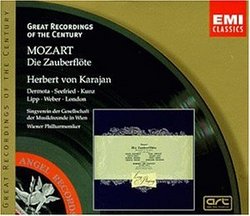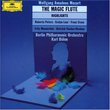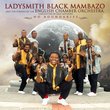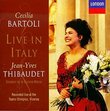| All Artists: Herbert von Karajan, Harald Proglhof, Vienna Philharmonic Title: Great Recordings Of The Century - Mozart: Die Zauberflote / Karajan, Dermota, Seefried, Lipp, et al Members Wishing: 0 Total Copies: 0 Label: EMI Classics Original Release Date: 1/1/1950 Re-Release Date: 9/21/1999 Album Type: Original recording remastered Genre: Classical Styles: Opera & Classical Vocal, Historical Periods, Classical (c.1770-1830), Modern, 20th, & 21st Century Number of Discs: 2 SwapaCD Credits: 2 UPC: 724356716520 |
Search - Herbert von Karajan, Harald Proglhof, Vienna Philharmonic :: Great Recordings Of The Century - Mozart: Die Zauberflote / Karajan, Dermota, Seefried, Lipp, et al
 | Herbert von Karajan, Harald Proglhof, Vienna Philharmonic Great Recordings Of The Century - Mozart: Die Zauberflote / Karajan, Dermota, Seefried, Lipp, et al Genre: Classical
|
Larger Image |
CD DetailsSimilar CDsSimilarly Requested CDs
|
CD ReviewsVintage Gold! Haas | Brooklyn | 04/28/2003 (5 out of 5 stars) "There's nothing quite like the conducting of the young Herbert von Karajan. Listening to his early '50s Mozart recordings is like tasting fine vintage wine. Under Legge, he directed a handful of exceptional recordings (FLUTE, FIGARO, COSI, all four Horn Concertos with Dennis Brain, etc.). It is a pity that this sense of joy and spontaneity, preserved here, eluded him later on in his career. Admittedly, I didn't care for this set at first; now I couldn't live without it. I believe any serious collector should own this beautiful, idiomatic, endlessly insightful version. If classic singing is involved -- especially Mozart singing -- I could usually care less about sound. Unfortunately, the mono transfer greatly hinders this 1950 recording. Sound-wise, it's no competition for, say, Bohm's later recording on DG, but Karajan's theatrical vibrance shines through: he brings out the warmth, charm and nobility of this great opera like none other, and the singing is miraculous. Anton Dermota is an inspired Tamino, my personal favorite on disc. Overall he's probably second to Wunderlich (for Bohm), who is the best sung Tamino anywhere. It's all a matter of taste, but I think Dermota really understands this young, sometimes reluctant character, and the acting is quite effective; his ear for German is much better than his Italian (e.g. Don Ottavio), and since Tamino is an outsider in this tale, I quite enjoy his "foreign"-sounding Eastern European dialect. Several Paminas may surpass Irmgard Seefried vocally (e.g. Gundula Janowitz for Klemperer), but none give such a tender reading of the text. Her brief "Die Wahrheit!" in Act One is deeply personal, adding so much dimension to Pamina in only a few bars of music. Seefried is never emotionally uninvolved, and makes this recording something extra special. Wilma Lipp, however, delivers a mostly "concert" version of the Queen's arias, and I really don't care. There is a frightful misconception that the Queen of the Night is the most important character in the opera anyway. Still, one of two fine performances should be supplemented: Rita Streich (for Fricsay) or the beguiling Lucia Popp (for Klemperer). As Papageno, Erich Kunz gives a benchmark performance. He brings a clear sense of point-of-view and dramatic event, as well as brilliantly understated comic timing. His near suicide attempt (with the entry of the three boys) is unspeakably good on this recording -- far and away the best recorded version until Solti's (with REAL boys), and still the most insightful anywhere. Ludwig Weber's "In diesen heil'gen Hallen" is the highlight of this entire Karajan recording. Luscious. His "Isis und Osiris" is sliiightly less involved, but still marvelous. I tend to enjoy a faster tempo (e.g. Bohm's) regardless. The ensemble work here is the best of any recorded version. The quintets, "Hm, Hm, Hm" and "Wie? Wie? Wie?", may be in fact the best ensemble singing I have ever heard. As mentioned before, The Three Boys were truly unrivaled until Solti and Ostman (many, many years later), and still possess a dreamy, other-world quality that is most satisfying. Truly magnificent. Unfortunately there's no spoken dialogue. A pity, especially for Kunz fans. Still. Who listens to these operas for the dialogue? Okay: MORE THAN ONCE? WHO CARES? Though flawed by puny mono sound and lack of spoken dialogue (if that matters), this is a LUMINOUS performance featuring virtuosic Mozartian singing and inspired conducting. A personal favorite." Furtwangler's cast in von Karajan's recording Howard G Brown | Port St. Lucie, FL USA | 01/20/2003 (4 out of 5 stars) "I believe this was the recording that soured Furtwangler on Walter Legge once and for all (except for the legendary Tristan and the Mahler songs with FiDe). Furtwangler's cast at the Vienna opera was hired by Legge for Karajan's recording -- and both conductors were under contract to EMI.Musical poltics and Vienna were made for each other!The cast is terrific -- maybe the best ever -- and although the 'pirate' conducted by Furtwangler is better than what Karajan gives us, Karajan has the better sound, and it does sound like perfectly fine 50's mono to me. I picked up the earlier incarnation on EMI, before the GRC repackaging, at a used shop in Manhattan for $... No regrets!" A post-war Magic Flute in style, with lovely singing and dul Santa Fe Listener | Santa Fe, NM USA | 07/03/2006 (4 out of 5 stars) "Before acknowledging the merits of this historic Magic Flute from Vienna, the Gramophone warned its readers of several drawbacks. The mono sound is close up, boxy, and dry (the Amazon reviewer calls it over-resonant, which makes me wonder if he bothered to play the record--these singers are barely an inch from the mike). The vienna Phil. strings are at times thin and edgy, a surprise but not unheard of in the rocky years just after WW II. There's no dialogue, which loses all the humor and much of the drama.
This, then, is a singer's Magic Flute with a famous conductor in his early prime. As such, we get a perfect portrait of traditional pre-war Mozart style, despite the fact that this was actually recorded in 1950. Tempos are relaxed, the tone is humane, humorous at times, light-hearted but with a serious emotional flavor between the two lovers. You have to adjust your ears at first; once you do, it's quite lovely. A reviewer below points out that this same cast--Seefired and Dermota as Pamina and Tamino, Wilma Lipp as the Queen of the Night, and Erich Kunz as Papageno--was appearing at the State Opera uner Furtwangler, and now in retrospect we have air checks from two of those performances on labels like Melodram and Opera d'Oro. In 1996 EMI released one from a radio broadcast of the 1951 Salzburg Festival. Furtwangler energized his cast in a way that they aren't here in the studio, and he's also more overtly romantic and spiritual than Karajan, so it's worthwhile seeking those recordings out if you are a fan of Die Zauberflote in its pre-war Viennese guise." |

 Track Listings (19) - Disc #1
Track Listings (19) - Disc #1






